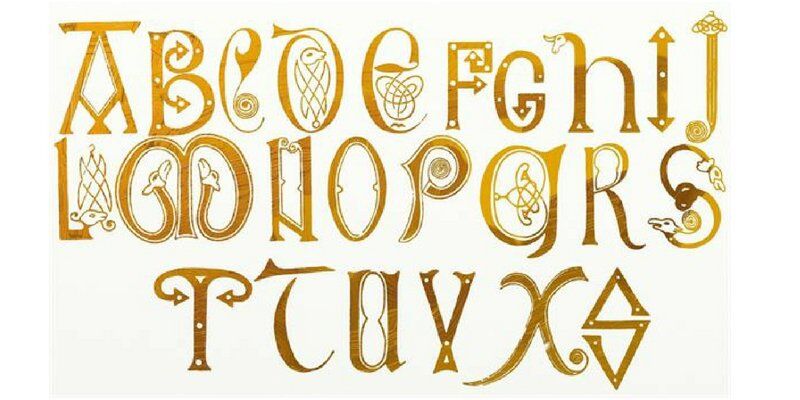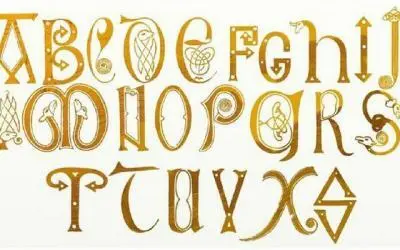Genealogy Alphabet. An alphabet for family research
Make your way through the genealogy alphabet with our selection of essential family history words which you’ll come across when discovering your ancestors. We’ve all heard the phrase ‘The past is a foreign country’ – and this foreign country comes with a foreign language, as we discover when tracing our family history.
To help you learn this ‘language’ our friends at Family History Magazine have compiled a listing of an intriguing selection of words, a genealogy alphabet that you will come across as you do your family history, and we think you’ll find it interesting to refer to, or even to browse through just out of curiosity.
In addition to explaining words that you have encountered, we also hope that the listing will inspire you to new avenues of research. Have fun and see what you might discover!
A
Admons – letters of administration (abbreviated as admons) issued when a person died intestate
Autosomal – relating to our autosomal chromosomes. Humans have 23 pairs of chromosomes; one pair of sex chromosomes and 22 pairs of autosomes
B
Burial register – registers were set up in the 16th century, and burials were often recorded with just name and date in the early years. ‘Burial in woollen’ refers to a Government requirement for people to have a burial woollen shroud or clothing, or else pay a fine of £5
Bawdy court – the ecclesiastical church courts which dealt with morality issues, such as adultery, witchcraft, etc
C
Carte de visite – photographic format popular in England from 1857 into the early 20th century
Cap badge – a metal badge showing the regiment/unit of personnel in uniform
D
Dissenters – members of Protestant Nonconformist denominations
Directories – Trade directories list the shops and businesses in an area, alphabetically by surname or county
E
Electoral Register – introduced in 1832 to record those eligible to vote. British Library holds collections which can be searched at Findmypast.co.uk
Endogamy – marriage strictly within a specific ethnic group
F
Freeholders’ lists – lists of those eligible to vote, like poll books
Folio – a leaf in a document, as opposed to a page number (eg in the census document references you need to note the folio and page number)
G
Gleaning – the legal right of cottagers to collect the remnants of harvest
Gazetteer – a geographical dictionary
H
Hiring fair – annual employment fairs, they were sometimes called ‘Mop fairs’ – as prospective employees would bring something to symbolise their line of work, eg mops for housemaids
Huguenots – French Protestants. In the late 1600s/early 1700s 50,000 fled to Britain from persecution in France
I
Inquest records – these may be held by the local archives, but failing that it is worth searching for a report of the death in the newspaper, as survival of coroners’ inquests is patchy Intestate – dying without leaving a will
J
Julian Calendar – the calendar dating system introduced under Julius Caesar, which remained in use in England and Wales until 1752
Justices of the Peace – often known as a ‘JP’, a judge over local court hearings for minor crimes
K
Kirk session – a body of church elders in Scotland that presided over a parish and its congregation. Records have been digitised and can be viewed at the ScotlandsPeople’s Centre, for information on ancestors seeking poor relief, being reprimanded etc
KIA – military acronym for ‘killed in action’
L
Local register office – find them listed at www.gov.uk/register-offices and find details of local BMD indexes at www.ukbmd.org.uk/local_bmd
Livery – non-military uniform; livery companies has come to mean the guilds that dressed their servants this way
M
Marriage bond and allegation – the written statement of the intention to marry (the allegation) and the agreement to forfeit a sum of money (the bond) should the marriage not go ahead
Memorial inscription– details on a gravestone, plaque, war memorial
N
Natural child – commonly used term for an illegitimate child (others being ‘base born’ or ‘bastard’)
Non Conformist – Protestant worship other than that of the Established Church, the Church of England
O
One-name study – research into and collection of all instances of a surname and its variants, the aim being to find the origins of the surname, to reconstruct the surname lines of as many families by that name as possible. In addition this this, (see surname history prints here)
One-hundred year closure period – often records will not be available to the public until 100 years after their creation, to protect peoples’ privacy
P
Parish registers – introduced by Thomas Cromwell in 1538. This is because his intention was that all baptisms, marriages and burials in a parish would be on record in a register Poll book. This is a list of voters and who they voted for.
Q
Quarter sessions – local courts held four times a year.
Quaker – a Christian Nonconformist denomination that began in the 1650s, and was also officially called the Religious Society of Friends
R
Rose’s Act – George Rose’s Act came into force on 1 January 1813 and consequently introduced printed forms for baptisms, marriages and burials to be recorded on
Relict – archaic term for a widow
S
Service records – the records of service personnel, typically including their attestation papers, records of conduct, postings and next of kin
Strays – people who move away from their place of birth and can be found in the records of another county
T
Tithe maps – use these maps, with the schedules, to trace your ancestors’ plots of land. The records are in archive at TNA. In addition, also see TheGenealogist.co.uk
Trade directories – published in the 18th, 19th and early 20th centuries, trade directories are certainly useful to study to find ancestors’ names, addresses and trades
U
Uniform – study old photos in detail (scan and zoom in, or use a magnifier) for clues about your ancestors’ time in uniformed occupation
V
Verso – the left-hand page of a book, or the back of a document
Verger – a church caretaker
W
Window tax – introduced in 1696 in England and Wales, this tax wasn’t repealed until 1851 and in the meantime many windows were bricked up to reduce the tax bill on a premises. Houses were taxed at two shillings per house, with additional payments for those with more than 10 windows
Will – legal document bequeathing worldly goods (land and property). The words wills and testaments are interchangeable.
X
X – the mark made by illiterate ancestors on official documents
Y
Y-DNA test – a genetic test to trace the fatherline, by way of a test of the Y-chromosome which passes from father to son
Z
Zeitgeist – A popular belief or sentiment of an era
We hope you’ve found our genealogy alphabet helpful. Check to see if we have the coat of arms and surname history print for your name here.



